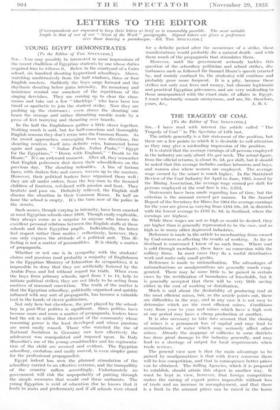LETTERS TO THE EDITOR
[Correspondents arc requested to keep their letters as brief as is reasonably possible. The most suitable length is that of one of our " News of the Week " paragraphs. Signed letters are given a preference over those bearing a pseudonym.--Ed. Tux SPECTATOR.]
YOUNG EGYPT DEMONSTRATES
[To the Editor of Tim SmerAron.] a,—You may possibly be interested in some impressions of he recent ebullition of Egyptian students by one whose duties required him to witness it. Below in the courtyard of a Cairo school, six hundred shouting hypnotised schoolboys. Above, watching unobtrusively from the hall windows, three or four English masters. Suddenly the boys surge forward and the rhythmic shouting below gains intensity. Its monotony and insistence remind one somehow of the repetitions of the singing dervishes. They are coming up to clear the class- rooms and take out a few " blacklegs " who have been too timid or apathetic to join the student strike. Now they are pushing up the staircases ; even above the shouting one hears the strange an rather disturbing rumble made by a press of feet hurrying and thrusting over boards.
In the hall the Englishmen gather a little closer together. Nothing much is said, but for half-conscious and thoroughly English reasons they don't retire into the Common Room. As the crowd approaches, converging from two directions, the shouting resolves itself into definite cries, hammered home again and again. " Nahcts Pasha, Nahas Pasha," " Egypt for the Egyptians," " Down with England," " Death to Sir Hoare." It's an awkward moment. After all, they remember that English policemen shot down their schoolfellows on the previous day. The shouting redoubles. A line of furious faces, with shaken fists and curses, wavers up, to the masters. However, their political leaders have organised them well ; they are all under orders, from the boy-men to the frenzied children of fourteen, red-faced with passion and heat. They hesitate and pass on. Definitely relieved, the English staff discuss the situation in their Common Room. In half an hour the school is empty. It's the turn now of the police in the streets.
Such scenes, though varying in intensity, have been enacted at most Egyptian schools since 1919. Though easily explicable, they always come as a surprise to anyone who knows the excellent personal relations between the English staffs at these schools and their Egyptian pupils. Individually, the latter feel respect rather than malice ; collectively, however, they can only express the attitude of a political unit. This ill- feeling is not a matter of personalities. It is chiefly a matter of propaganda.
Whether or not one is in sympathy with the students' claims and passions (and probably a majority of Englishmen in the Egyptian Ministry of Education do sympathise), it is impossible to deny that they arc artificially fostered by the Arabic Press and fed without regard for truth. When even the boys from primary schools, aged from 7 to 14, help to initiate political strikes, they arc not likely to be acting from motives of reasoned conviction. The truth of the matter is that the Egyptian schoolboy, politically organised and quickly inflamed with any sort of propaganda, has become a valuable tool in the hands of clever politicians.
Not only here but elsewhere, the part played by the school- boy in post-War politics is significant. Since politics have. become more and more a matter of propaganda, leaders have had the wit to utilise that element of the community whose reasoning power is the least developed and whose passions are most easily roused. Those who watched the rise of National Socialism in Germany saw how effectively the adolescent was manipulated and imposed upon. In Italy Mussolini's use of the young swashbuckler and his regimenta- tion of the child are avowed and evident. The Egyptian schoolboy, credulous and easily moved, is even simpler game for the professional propagandist. • Egypt indeed has seen the planned stimulation of the schoolboy carried to an effective extreme, and the tranquillity of the country suffers accordingly. Unfortunately no government will risk the unpopularity of putting through the simple measures that would end these outbursts. The young Egyptian is avid of education (for he knows that it leads to posts and preferment) and if all schools were closed for a definite period after the occurrence of a strike, these Inanifestations would probably die a natural death—and with them much of the propaganda that stimulates them.
However, until the government seriously tackles this question of the schoolboy politician and school strikes, dis- turbances such as followed Sir Samuel Hoare's speech (started by, and mainly confined to, the students) will continue and probably grow more frequent. It is a pity, because these strikes not only cost lives and money, but obscure legitimate and practical Egyptian grievances, and are very misleading to those unacquainted with the exact state of affairs in Egypt. I must reluctantly remain anonymous, and am, Sir, therefore,












































 Previous page
Previous page